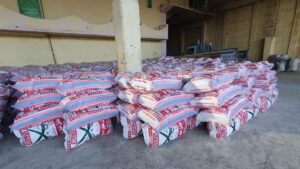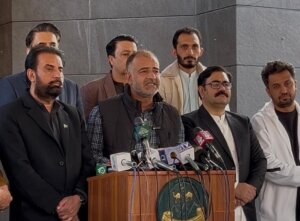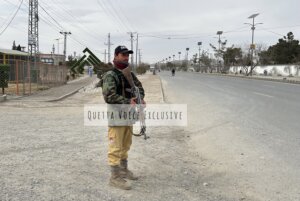By Muhammad Asghar Harifal
LISTEN ARTICLE
Pakistan is an agricultural country, having 70 % of the population directly dependent on agriculture, while the other 16 % is indirectly linked to it. Its people have always been buffeted, after every 4-5 years interval, with the crisis of staple food, in particular the wheat grain. Other than Punjab, no other province is self-sufficient in wheat production, thus generating total and everlasting dependence on a single province.
Punjab has traditionally been the fruit basket of the sub-continent
Punjab has traditionally been the major part of the food basket of the sub-continent due to it being the land of rivers. After the partition of India and the consequent division of Punjab, the staple food dependence of western Pakistan continued to be on Punjab.
The frequent crises, the poor man is subjected to, are despite the vast arrangements in place in the form of public sector departments of Agriculture and Food.

The Agriculture Department, with heavy resources at its disposal, has fallen short to contribute in mitigating the crisis by giving incentives to farmers to grow wheat. The production of wheat in Balochistan is nearly 0.8m tons, meeting nearly 50% of its requirements. Due to the sparse population, the Agriculture department’s sources are sufficient enough to add a million tons of wheat grain.
The Food department, functioning as procuring and stock-maintaining agency, was brought into existence in British times when the staple food crop was not enough to meet the requirements of the population.
Earlier, ration cards were being issued as per the number of family members
Initially, wheat and sugar were stored in department stores. In addition to storage, a rationing arrangement was put in place. Under rationing, the ration cards were issued according to the number of family members and through that ration, dealers would issue the allocated quota. It continued until the late seventies when bumper crops were produced with the introduction of machinery replacing the age-old farming means.
The Food department at the provincial level continued with seasonal procurements of wheat under state trading. In other words, the public exchequer was allowed to be used by the Food department to indulge in trade and to store a strategic reserve of 3 months to be utilized in any eventuality. When the blight of stagnancy overtook the public institutions, the state trading couldn’t evade it, rather it suffered the most. The wheat trade under the aegis of the Food department turned into a lucrative source of income for a minuscule coterie consisting of a few individuals. To be more specific, they were those controlling the department at the top, using as tools, the public officials who stand in low pay-scale hierarchy thus getting petty salaries but taking care of hundreds of millions of rupees stock and the wheat grinding facilities owners.
The department is tarnished to an extent that procurement is considered as a dark motive
The state trading got characterized by consistent losses, multiple subsidies (at purchase and selling stages), influential interest groups (again a few), convoluted procurement and sale, stock spoilage, and a series of unending inquiries sans conclusion. The department is tarnished to the extent that procurement(its sole purpose of existence) case initiation is considered as the dark motive of the head office of the department. It goes to the credit of influential parliamentarians of the wheat-producing areas using their political clout to make it happen, irrespective of the opinion of the department officials, as they stand irrelevant. At the next stage, the irrelevant officials have no say to select poor farmers for whom the subsidy from the public exchequer is made.
The first right over the subsidy turns out to be of those who made the procurement take place. As all public institutions are to serve the already served class, the poor farmer toil as usual without knowing about the subsidy in his name. It not only deprives the poor farmer of his due right Los, but he also loses interest to cultivate wheat for his co-citizens. One twist in the system lead to another; the weak officials with no option but to pick what awaits them and pile stock in department stores, maintained with public exchequer, ending up into unsaleable stock. Here unending saga of woes begins: either to scale down the purchase price to make it compatible with a marker or be ready for a daredevil functionary who will sell the stock and throw the job along with trickling wages to the wind. Thus, a purpose for the processes of ‘put up’, is engendered (the buzzword of every public office).
It takes three months to place funds to purchase wheat
The procurement of wheat got so maligned that each case of procurement, when initiated by the department, took more than three months to place the fund at the disposal of the department for the purchase of the stock. The hesitation at different stages, causing the delay, is not enough to prevent it, only the processes are put off, causing embarrassment only for battered department staff.
Inquiries against the staff and high officials galore but only to punish the individuals against whom the allegations are leveled.
The causes of mismanagement, engendering heavy embezzlements, go by unattended. The element of punishment is predominant to the extent that in one of the inquiries probing the causes of delay of procurement, the inquiry officer sought the help of the Food Account Manual, which deals with accounts of the stock, that was not there. The manual which dealt with the post-procurement was used to track the travel and stay of file as if Food Account Manual also worked as GPS. It is the only written document dealing with stock and is quoted to whoever wants to make a display of his knowledge about the food department.
This whole edifice is created to keep a strategic reserve to meet emergency requirements in case of natural calamity or war, stabilize the staple food market and fulfill the food requirements of citizens. Unfortunately, none of the above needs are met by the stock procured by the food department, involving precious scarce resources and elaborate arrangements in the form of a public department with millions of running expenditures.
Each year, a target of 0.1m ton is set for procurement from all over the province but it is uniformly made from the Naseerabad division and vicinity. Never has the procurement target been achieved except for very few procurements. The province requirement is nearly 1.6 million tons, while the targeted procurement, even if made, gets to 6.25%. An average of 2 to 3% is stored and that too when the stock is available to be procured. The quoted quantum of stock meets none of the above-stated purposes of the raison d’etre of the food department. Our emergency preparedness became evident when in Feb 2019 the war-like situation developed with India in the aftermath of airstrikes in Balakot. In the civil administration meeting called for the preparation for the eventuality of war, the Balochistan Food department reported nil stock.
The Writer is Ex Secretary Food Department





